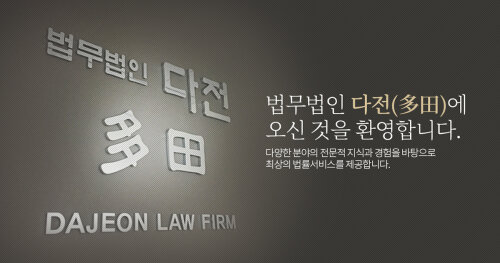Best Creditor Lawyers in Seoul
Share your needs with us, get contacted by law firms.
Free. Takes 2 min.
List of the best lawyers in Seoul, South Korea
About Creditor Law in Seoul, South Korea
Creditor law in Seoul, South Korea governs the relationship between creditors and debtors. It involves the legal processes and procedures that creditors can use to collect debts owed to them by debtors. This area of law is essential for protecting the rights and interests of creditors while ensuring fair treatment for debtors.
Why You May Need a Lawyer
You may need a lawyer specializing in Creditor law in Seoul, South Korea if you are a creditor trying to collect a debt from a debtor who is not cooperating. A lawyer can help you understand your rights, assess your options for debt collection, and represent you in court if necessary. Additionally, a lawyer can also help you navigate the complex legal procedures involved in creditor-debtor relationships.
Local Laws Overview
In Seoul, South Korea, creditors have several legal tools at their disposal to collect debts from debtors, including wage garnishment, asset seizure, and foreclosure. It is important to understand the specific laws and regulations governing creditor-debtor relationships in Seoul to ensure compliance and protect your interests.
Frequently Asked Questions
1. Can a creditor freeze my bank account without notice?
In Seoul, South Korea, a creditor cannot freeze your bank account without obtaining a court order first.
2. Can a creditor repossess my property without warning?
No, a creditor must follow legal procedures and obtain a court order to repossess your property in Seoul, South Korea.
3. What are the consequences of not paying my debt to a creditor in Seoul, South Korea?
If you fail to repay your debt to a creditor in Seoul, the creditor may initiate legal proceedings to collect the debt, which could result in wage garnishment, asset seizure, or other enforcement actions.
4. How can I dispute a debt that a creditor claims I owe?
You can dispute a debt claimed by a creditor in Seoul, South Korea by providing evidence or documentation to support your case. It is advisable to seek legal advice to guide you through the dispute resolution process.
5. Can a creditor harass me to collect a debt in Seoul, South Korea?
No, creditors are prohibited from engaging in harassment or abuse to collect debts in Seoul, South Korea. You have rights protected by law, and you can seek legal assistance if you are being harassed by a creditor.
6. What are the legal rights of creditors in Seoul, South Korea?
Creditors in Seoul have the legal right to collect debts owed to them by debtors through legal means, including court orders for wage garnishment, asset seizure, and other enforcement actions.
7. How long does a creditor have to collect a debt in Seoul, South Korea?
The statute of limitations for debt collection in Seoul, South Korea varies depending on the type of debt. It is advisable to seek legal advice to determine the applicable statute of limitations for your specific case.
8. Can I negotiate with a creditor to settle a debt in Seoul, South Korea?
Yes, you can negotiate with a creditor to settle a debt in Seoul, South Korea. It is advisable to seek legal advice to help you negotiate favorable terms and ensure that the settlement is legally binding.
9. What are the consequences of declaring bankruptcy as a debtor in Seoul, South Korea?
If you declare bankruptcy as a debtor in Seoul, South Korea, your debts may be discharged, and your assets may be liquidated to repay creditors. It is important to consult with a lawyer specializing in bankruptcy law to understand the implications of declaring bankruptcy.
10. Can a creditor garnish my wages in Seoul, South Korea?
Yes, a creditor can garnish your wages in Seoul, South Korea if they obtain a court order authorizing wage garnishment to collect a debt owed to them.
Additional Resources
For more information on creditor law in Seoul, South Korea, you can contact the Seoul Bar Association or visit the website of the Korean Legal Aid Center for Family Relations.
Next Steps
If you need legal assistance in creditor matters in Seoul, South Korea, it is advisable to consult with a qualified lawyer specializing in creditor law to assess your options and protect your rights. A lawyer can guide you through the legal processes involved in creditor-debtor relationships and help you achieve a favorable resolution to your case.
Lawzana helps you find the best lawyers and law firms in Seoul through a curated and pre-screened list of qualified legal professionals. Our platform offers rankings and detailed profiles of attorneys and law firms, allowing you to compare based on practice areas, including Creditor, experience, and client feedback.
Each profile includes a description of the firm's areas of practice, client reviews, team members and partners, year of establishment, spoken languages, office locations, contact information, social media presence, and any published articles or resources. Most firms on our platform speak English and are experienced in both local and international legal matters.
Get a quote from top-rated law firms in Seoul, South Korea — quickly, securely, and without unnecessary hassle.
Disclaimer:
The information provided on this page is for general informational purposes only and does not constitute legal advice. While we strive to ensure the accuracy and relevance of the content, legal information may change over time, and interpretations of the law can vary. You should always consult with a qualified legal professional for advice specific to your situation.
We disclaim all liability for actions taken or not taken based on the content of this page. If you believe any information is incorrect or outdated, please contact us, and we will review and update it where appropriate.















